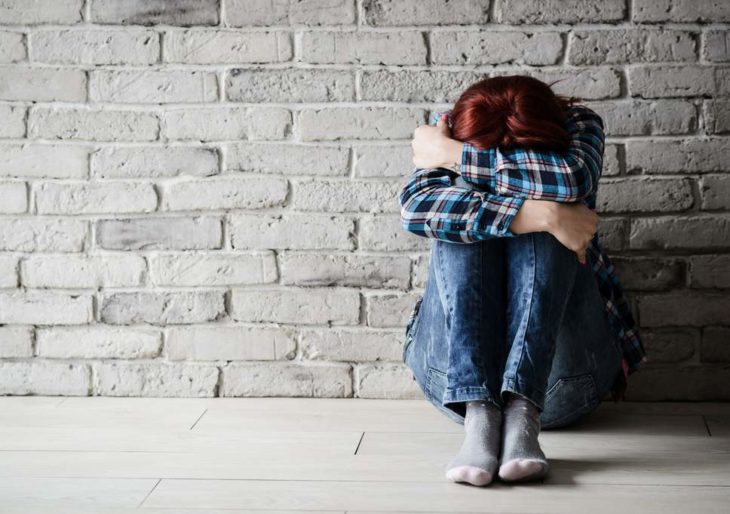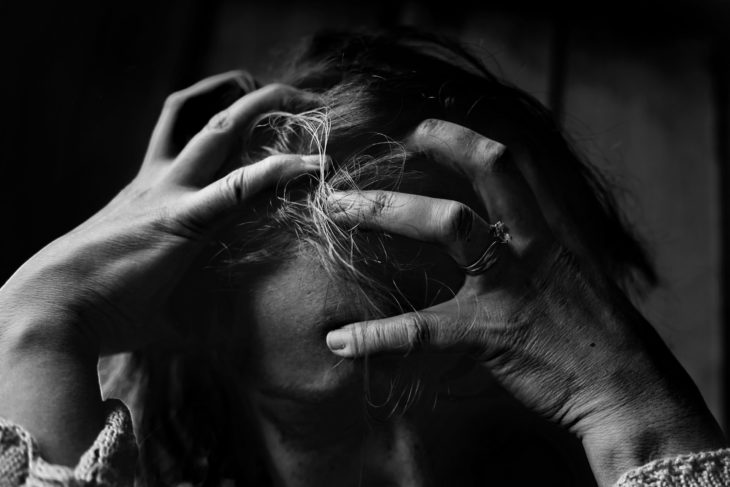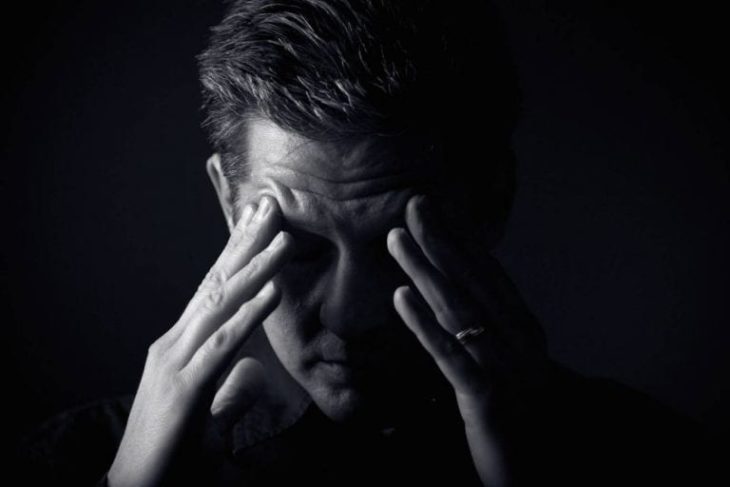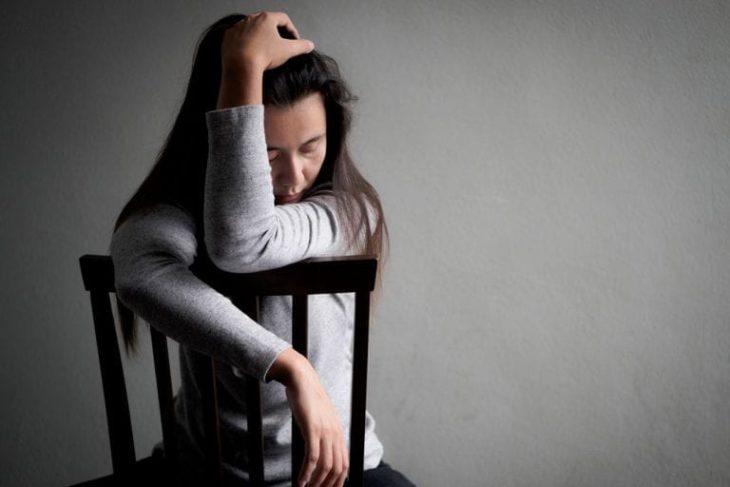Clinical depression sucks and it’s only growing more common. Almost one in two people in the U.S. will suffer from depression or another mental health condition at some point and about one in 17 Americans actually has a serious mental illness right now.
Despite its rising rates, depression can be hard to wrap your brain around, especially if you’ve never had it. It’s not easily treated or cleared up by positive thinking, or yanking yourself up by your bootstraps, or shoving your feelings to the dark corners of the back of your mind. It’s so much deeper and more insidious than that. I once described depression this way:

Source: The Independent
“None of those external good things you have going for you] truly register or resonate when you have depression. You can logically identify them as Good Things, and you know they are supposed to make you feel Good, but you can’t feel them, they can’t get in. It’s like your brain is wearing a full-body armor designed to keep only the good things out. Bad things … get ushered in instantly, like VIPs.”
People who don’t have depression don’t always know what to say that could possibly help to a friend or family member going through the all-encompassing yet simultaneously utterly numb sensation of your own brain turning against you. Here are a few things not to say (unless you want said friend or loved one to grow homicidal as well as miserable):
Contents [show]
1. “Cheer up” or “chin up.”
This is the be-all, end-all of insensitive ways to respond to someone who is suffering from depression. It manages to completely trivialize and invalidate their feelings at the same time — what a feat! This one is a trite, classic, never-fail nugget routinely uttered by Pollyanna-ish positive thinkers who don’t understand how you’re feeling, so they assume it must only feel as bad as the last time they got slightly sad about their boss’ mean comment or their best friend skipping their birthday party. Depression and situational sadness are not the same thing, people. If it were easy to just flip a switch and go from depressed to super-psyched on life, don’t you think we would have flipped it by now?

Source: stanforddaily.com
2. “But medication will only numb your feelings.”
People who’ve never had mental illness can sure have lots of opinions about what works to treat it. One of the most common ways I’ve witnessed this is via concerned interlopers making snarky comments about a friend’s decision to try treating their depression with psych meds. Medication can be remarkably effective for some people; 60 to 70 percent of depressed patients who are given an antidepressant actually recover in three to six weeks. But still outsiders opt to butt in with their thoughts about what they’ve heard passed off as fact in dubious corners of the Internet. For lots of people with mental illnesses like depression, meds don’t numb your feelings — they make your feelings a bit more tolerable, enough to get out of bed. You can’t really put a price — or a judgment call — on that.
3. “But you have sooooo much to be thankful for!”
AGGHHH, again with the Pollyanna positive-thinking crapola! Thank you soooo much for reminding me how few “legitimate” reasons I have to be depressed (as if depression were based on cold, factual reality instead of out-of-whack chemical wiring). Thank you for making me feel guilty about being unable to just “snap out of” my illness, as if I could actually control it. I have a working understanding of the power of gratitude. I’ve tried the whole daily-gratitude-email-listserv thing — hasn’t everyone? And I have no doubt that consciously trying to name and recognize the great aspects my life could be helpful. But does that mean it will have even the tiniest hint of perceivable impact on my depression? Doubtful.

Source: breathetherapies.co.uk
4. “Have you tried affirmations?”
The same person urging you to start coughing up daily gratitude lists is the same person who’ll oh so helpfully suggest that you try sticking Post-Its all over your apartment. These Post-Its will, clearly, contain the magical key to your mental health, and the lame, half-formed sayings you half-heartedly scrawl on them will, obviously turn your frown upside down with their clarity, power, and fervent insistence that YOU ALREADY HAVE EVERYTHING YOU NEED and THERE’S NO ONE IN THE WORLD WHO DESERVES LOVE MORE THAN YOU and YOU ARE BIGGER AND BETTER AND BRIGHTER THAN YOUR PROBLEMS. Or … they might just clutter up all your available vertical surfaces and make you feel shittier for never doing your affirmations.
5. “I guess this is just your cross to bear.”
I had a friend who used to say this to me on the regular whenever I’d complain about my nonexistent love life. She didn’t say it regarding my depression, per se, but I think this attitude can apply to people’s responses to mental illness. Writing off someone’s pain AND their mental health issues as simply being part of their fate, or destiny, or albatross, isn’t only minimizing and demoralizing, it’s downright DEPRESSING. Thanks for the inference that this is something bound to NEVER EVER END, that’s totally bound to make me feel less depressed about my lot in life!

Source: gq-magazine.co.uk
6. “Have you considered going gluten-free (or dairy-free, or sugar-free, or meat-free, or or or …)?”
Here’s a list of all the things I’ve tried in an effort to help tamp down my depression: cutting out sugar, cutting out dairy, cutting out gluten, cutting out carbs, eating chicken and turkey again after being vegetarian for 20 years, taking gross-tasting amino acids, herbs, tinctures, and bizarro hippie vitamins of all stripes … Oh and did I mention the acupuncture sessions, getting something called a DNA healing (don’t ask), doing hypnotherapy, seeing psychics, and shelling out a fortune on a questionable-sounding brain-training practice called neurofeedback? Well, yeah. There you have it. Making simple dietary changes might help someone, somewhere, with her bouts of depression. But honestly, it’s done nothing for me. Thanks for the thought, though.
7. “Isn’t it kind of all in your head, though?”
Oh look, it’s another completely embarrassing, demoralizing question that manages to erase a depressed person’s (valid) feelings from the picture! The notion that we’ve somehow created or contributed to our own depression is just, well, bullshit, and inferring that to someone who is suffering is actually kind of evil. I’m not saying that depressed folks don’t have negative, pessimistic thought patterns. Of course they do — they tend to obsess, ruminate, and nit-pick, if they’re anything like me. But blaming an illness entirely on the way they think just isn’t cool, because it puts the bulk of the “blame” for their depression squarely on their own shoulders. Don’t go there.

Source: tasteforlife.com
8. “Have you considered therapy?”
Why no, no I haven’t! I’ve never even HEARD of therapy! What is it, exactly, could you shed some light? It’s obviously not something I’ve been doing EVERY SINGLE WEEK since age 15 (that’s a grand total of more than 20 years, thanks) and it’s something I’ve never considered, actually, because I am both mentally and emotionally deficient, you see, and for some reason my dark thinking has made me utterly unable to research strategies to manage the condition that’s been with me since teendom. Thanks for the resounding vote of confidence!
9. “I totally know how you feel — I’ve been sooooo depressed about my breakup …”
Depression sufferers across the world are well acquainted with this one. You’re detailing the shittiness of your existence to a friend. She stares at you and listens, rapt … for a couple minutes. Then she grabs the conversational reins and steers the thing in a whole new direction — the direction of HER. Suddenly she’s trying to relate too much, trying to reassure you that you’re not alone by making you feel ignored and brushed aside. Hey, friends: If you’re talking to a depressed friend, all you really need to do is listen. They’ll get more out of a sympathetic but quiet ear than one who’s frantically spinning her wheels to try to smooth over your pain with her own. (And since the circumstances of clinical depression and situational depression are so different, it rarely works.)

Source: Medical Daily
10. “Maybe you just need a good cry. Want me to bring over ‘The Notebook’ and some fro-yo?”
We could all use a good cry sometimes and it’s genuinely sweet when friends want to help out in your time of melancholia. They mean well when they suggest that watching a movie or eating something yummy will boost your mood — though, come to think of it, maybe that’s NOT what they’re truly suggesting. Maybe they’re just trying to help distract you from the pain, in which case, I’m changing my position! Because if you’re going to feel like shit anyway, you might as well roll around in it a bit while you watch a hokey film and stuff your face, with one of your best buddies by your side. I’m all for mindless escapism (hey, temporary pleasures are still pleasures, which depressed people tend to be deficient in), so maybe this one actually isn’t a “don’t” after all. Carry on!
Original by Laura Barcella
